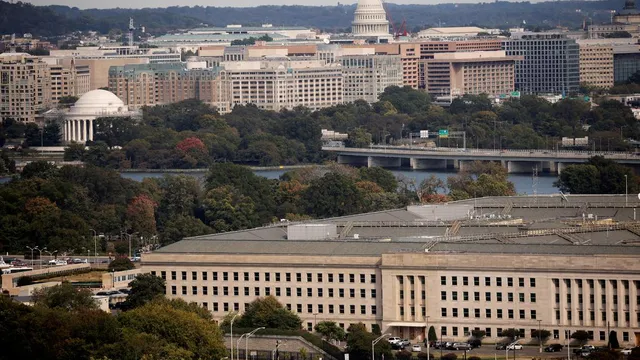
U.S. approves $100 million arms sale to Saudi Arabia amid ongoing conflict
2025-03-21 05:22- The U.S. has approved the sale of 2000 advanced precision kill weapon systems to Saudi Arabia, costing an estimated $100 million.
- This move comes amid ongoing military operations targeting Houthi forces in Yemen, following recent strikes that killed at least 31 individuals.
- The sale represents a significant aspect of U.S. support for Saudi Arabia in its efforts to alleviate threats posed by Houthi drones.
Express your sentiment!
Insights
The U.S. has authorized significant military support for Saudi Arabia by approving the sale of advanced precision kill weapon systems, known as APKWS, as of Thursday. This decision occurs within the broader context of the ongoing conflict in Yemen, which has escalated in recent weeks with a series of U.S. strikes against Houthi targets. These strikes commenced after President Donald Trump took office, marking one of the most intense military operations in the region since the new administration began. As a consequence of this conflict, Yemen has seen considerable loss of life, with tens of thousands dead and millions facing food shortages. The approved weapon systems are targeted laser-guided rockets that are expected to enhance Saudi Arabia's military capabilities, particularly against low-cost drones employed by Houthi fighters. Priced at approximately $22,000 each, the system is viewed as a viable strategy against Houthi drone attacks, which have disrupted maritime activities in the Red Sea and posed a significant threat to regional security. The Pentagon will manage the sale and training associated with these weapons, with BAE Systems identified as the main contractor for this military deal. The ongoing civil war in Yemen, which erupted in late 2014, has drawn international attention due to its humanitarian implications. Saudi Arabia's initiative to support the Yemeni government stems from a prevailing concern over the influence of Iran in the region. This conflict has unfolded alongside a series of diplomatic maneuvers and interventions by various nations. Despite the approval of this arms sale, no contract has been finalized yet, indicating that negotiations are still in progress. In light of the recent military actions and the arms sales approval, it is clear that the U.S. remains deeply engaged in the geopolitical complexities of the Middle East. As the situation develops, the implications of this military support will likely play a crucial role not only in the regional power dynamics but also in the ongoing humanitarian crisis faced by the Yemeni population. The situation in Yemen, marked by a fragile ceasefire established in 2022 that has failed to stabilize the region effectively, continues to raise urgent questions about the future of U.S. foreign policy and its impact on the long-standing conflict.
Contexts
The conflict in Yemen, ongoing since 2014, has drawn international attention due to its profound humanitarian implications and the complexity of the various actors involved. Central to the discourse surrounding the conflict is the role of U.S. arms sales to Saudi Arabia and its coalition partners, who have been engaged in military operations against Houthi forces. U.S. arms exports aim to bolster the defensive capabilities of Saudi Arabia and enhance regional stability. However, the dual-use nature of many military items has sparked significant concern, as these arms can be used against civilian populations, exacerbating the humanitarian crisis. Reports indicate that U.S. weapons have been implicated in various incidents leading to civilian casualties and destruction of critical infrastructure in Yemen, raising ethical and legal questions regarding the responsibility of the arms supplier. Moreover, the lack of accountability and transparency in tracking how these arms are used complicates the assessment of their impact on the conflict. Critics argue that U.S. arms sales contribute to prolonging the conflict, as they empower Saudi-led coalition forces to sustain military operations. The continued supply of arms is seen as enabling operations that have resulted in widespread violations of human rights, including airstrikes leading to civilian deaths and blockades causing famine. Humanitarian organizations have warned that the blockade, in part supported by the military actions funded through U.S. arms sales, has created one of the world's worst humanitarian crises, with millions of Yemenis on the brink of starvation. In addition to immediate impacts, the long-term consequences on Yemen's infrastructure and societal fabric could hinder recovery and peace efforts for generations. From a geopolitical perspective, U.S. arms sales to Saudi Arabia are intertwined with broader strategic interests, including countering Iranian influence in the region, maintaining arms trade partnerships, and ensuring that U.S. allies possess the means to defend themselves. This nexus of military and political interests complicates U.S. foreign policy decisions, as officials balance the need for regional security with the moral imperative to prevent civilian suffering. Legislative proposals to limit arms sales based on human rights considerations have faced significant pushback, highlighting the contentious nature of the debate over the arms trade and its repercussions on international relations. In conclusion, the impact of U.S. arms sales on the Yemeni conflict cannot be viewed in isolation from the broader humanitarian crisis and geopolitical dynamics at play. While the aim of these sales might be to enhance security for U.S. allies, the ramifications of such actions on the ground in Yemen are profound and troubling. Addressing the continuing fallout from these sales requires a reevaluation of policies, increased scrutiny of military aid, and a commitment to ensuring that humanitarian needs are prioritized over strategic interests. Efforts to establish a peace process must consider the role of arms and seek to halt all forms of violence to pave the way for a sustainable and just resolution to the conflict in Yemen.